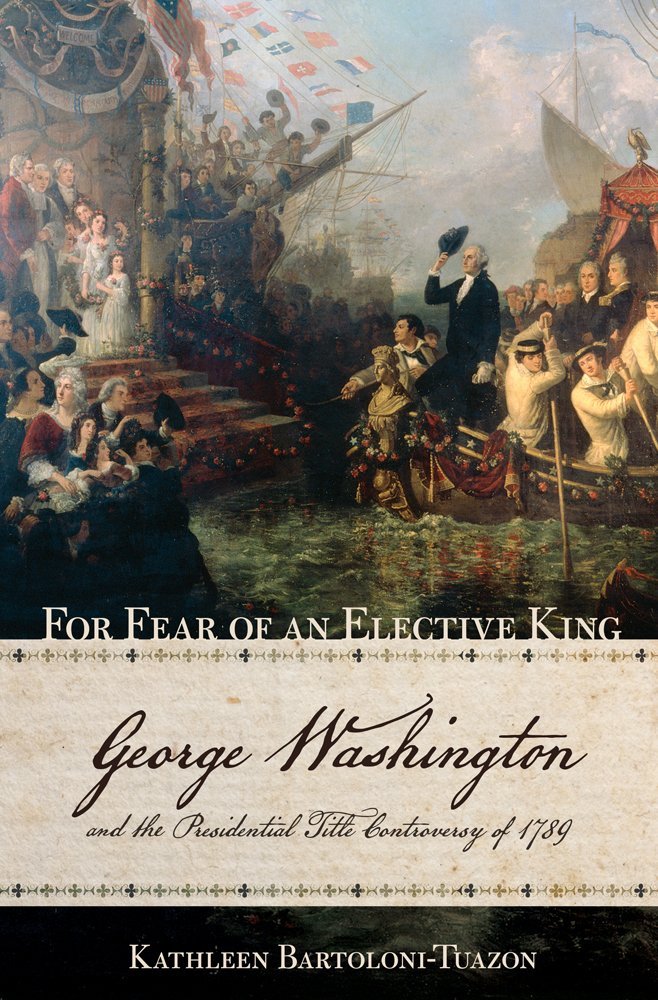Q&A
Q: What was the presidential title controversy of 1789?
A: The presidential title controversy of 1789 embroiled Congress in its first dispute—over how to address the new nation’s new executive. The Senate majority favored a lofty title while the House stood unanimously and adamantly opposed to anything more than the simple and unadorned “President.”
Q: What were some of the titles that were considered?
A: Congress, the press, and individuals throughout the country debated more than thirty titles, most with royal overtones. Suggestions for a title ranged from “President” to “His Majesty the President” to various forms of the frequently-used “Highness,” including the Senate-endorsed “His Highness the President of the United States of America, and Protector of their Liberties.” Other examples include “Excellency,” “Elected Majesty,” “Sacred Majesty,” “Serene Highness,” “His Highness the President General,” and “The Delight of Human Kind.”
Q: When did the controversy begin in Congress and what was the legislative outcome?
A: The presidential title controversy formally began in Congress on April 23, 1789, with Senator Richard Henry Lee’s motion for a titles committee. The question of an executive title occupied the Senate and House in acrimonious deliberations for the next three weeks. On May 14, the Senate agreed to the address of “President of the United States,” capitulating to the House and its stated wish for no title other than the designation of the “office expressed in the Constitution.”
Q: Was the legislative decision in favor of “President” the end of the title controversy?
A: No, it was just the beginning! The title controversy had two phases—a legislative phase and a public phase—and both burned bright with the fire of strongly held convictions. Intense, insular, and less than a month long, the legislative phase occurred largely within the confines of Congress. The expansive and compelling public phase of the controversy unfolded throughout the country over a longer period, especially over the summer and fall of 1789, as the people and the press examined questions of national character, federalism, and executive leadership and power.
Q: How did the title controversy affect the American public?
A: Public attitudes toward the presidency remained unresolved from the ratification era. In addition, honorifics remained entrenched in post-revolutionary America. The new presidency and the title controversy forced the people to consider and find an acceptable balance between elite power and the people’s sovereignty.
Q: How did the prestige of George Washington affect the presidency and the dispute about a presidential title?
A: George Washington’s celebrity represented both a blessing and a curse for the presidency. He was the unanimous, most trusted choice for the controversial position. However, the enthusiasm and reverence shown him threatened the presidency with monarchical undertones, which included the dispute over how to address the president.
Q: How did George Washington’s leadership during the title controversy affect early notions of executive power?
A: Washington and the people developed the tenets of American executive leadership: a required modesty—established by the decision favoring the simple title of “President”—and an acknowledgement of the interdependence that must exist between the people and their leader—Washington’s stance against a grand title mirrored the bulk of popular opinion. Executive power was fledged by not flaunting it. Washington’s republican model of executive leadership set the stage for Thomas Jefferson and the further development of the democratic leadership model. The democratic leadership model finds no contradiction between democracy and strength.
Q: Who were some of the other political actors during the legislative battle?
A: Alarmed that a president would prove corruptible and a puppet of state elites or world leaders, John Adams and Senator Richard Henry Lee of Virginia advocated for a lofty title to boost executive authority. Even though a strong president also could prove unscrupulous and corrupt, they viewed all-powerful Senate dominance over an anemic national leader as the greater and more present danger. The other side of the controversy dreaded a despotic, all-powerful president. Abhorrence of monarchical rule and the resultant loss of representative governance fed a fierce resistance to an exalted honorific by Senator William Maclay of Pennsylvania and Representative James Madison of Virginia, as well as the rest of the House.
Q: Beyond the legislative outcome of the modest title of “President,” what was the impact of title controversy?
A: The modest title of “President” quelled fears of monarchical rule and bolstered the people’s confidence in Congress, the new government, and office of the president. However, the controversy formed the leading edge of increasingly partisan battles over the extent of executive power. The title controversy also continued the Revolution’s siege on designations of status in America.
Q: How did the title controversy affect the relationship between the presidency and the vice presidency?
A: Intriguingly, a legacy of the title controversy may have been the casualty of the professional relationship of the presidency to the vice-presidency. John Adams’s promotion of grand executive titles without Washington’s approval coupled with other aspects of his career may have damaged Washington’s trust in him to such a degree that Washington relegated Adams to a minimal role, which set a precedent for a diminished vice presidency. In addition, Adams (who favored a regal title for the president to boost presidential authority over the Senate and other potentially corrupting influences) devalued his role as vice president in favor of his perceived role as Senate watchdog. Ironically, Adams’s sacrifice of the vice-presidency empowered the president to dominate the executive branch and helped create the energetic leader that he had sought through grand titles.
Q: What is the ultimate legacy of the title controversy of 1789?
A: The ultimate legacy of the title controversy is an expansion and consolidation of presidential power within the limits placed upon the president that governing within a popular sovereignty brings. Foremost of those limits are the people’s demand for restraint, essentially a command over the power of command, and for an acknowledgement of their will from the country’s leader.
